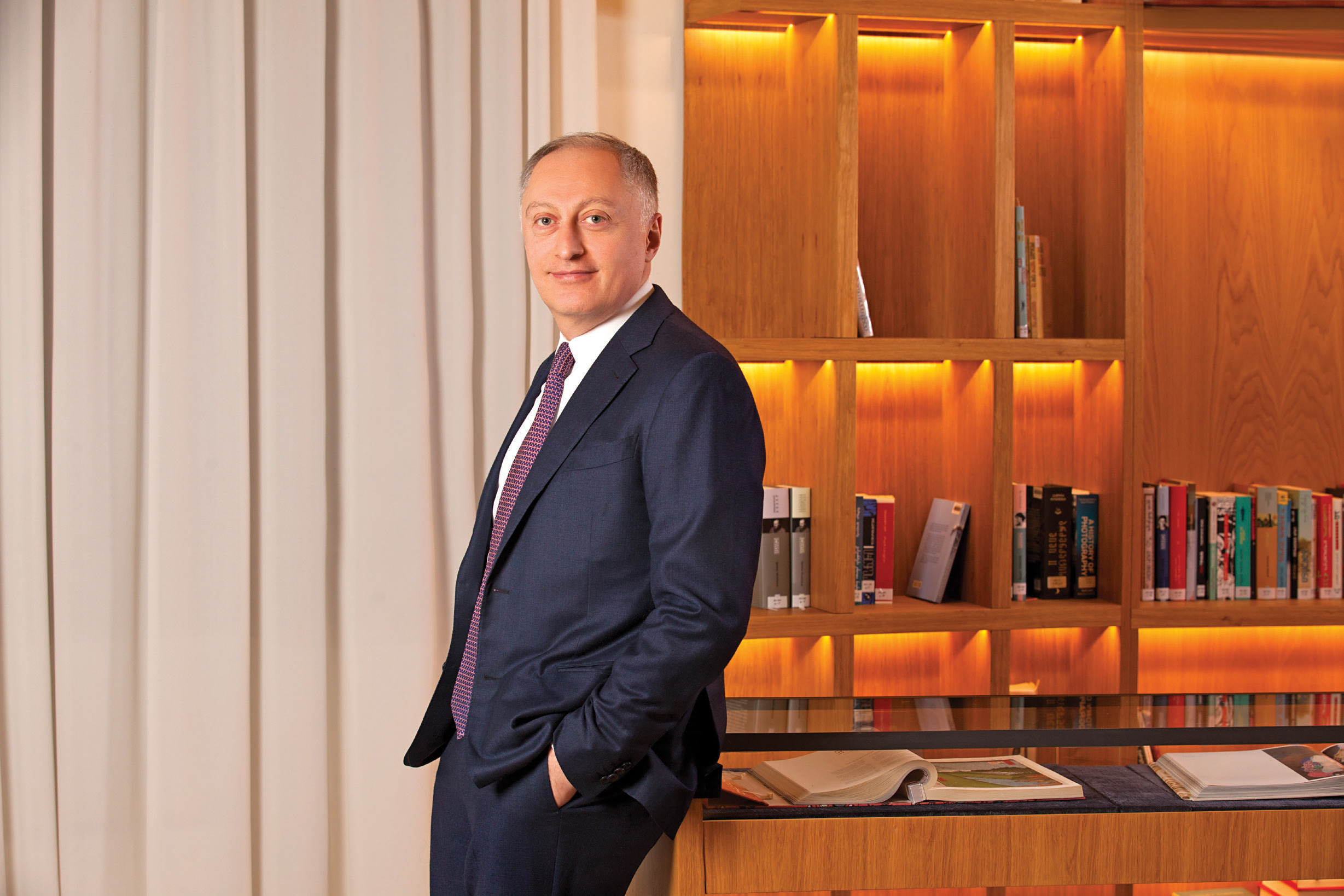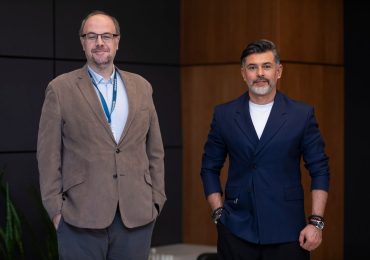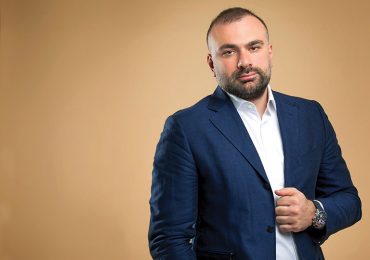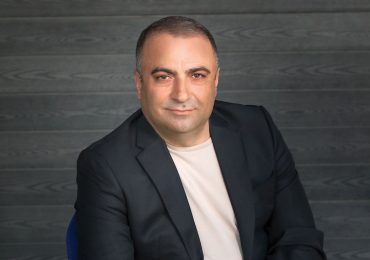TBC is expected to have seven million customers by 2025,
which is almost twice the population of Georgia. “We will definitely reach this target,”
says CEO Vakhtang Butskhrikidze as he summarizes thirty years of TBC.
TBC IS THIRTY YEARS OLD – THE SAME AGE AS THE ECONOMY OF INDEPENDENT GEORGIA.
In three decades, TBC went from a small bank to being listed on the London Stock Exchange and having regional ambitions. However, it is now more than a bank. It is a financial institution that strives towards implementing new technology to maintain its position as the market leader and always keeps up with the pace of customer demands.
I have spoken to Vakhtang Butskhrikidze numerous times – mainly about challenges, economic growth, policy decisions, the role of business in the country, and so on. Five years ago, he was on the cover of Forbes Georgia, where I labeled him “the Stable Banker”. So before starting the interview at the TBC office on Marjanishvili Street, I had to think longer than usual about the topic to focus on during our last conversation.
I recalled the day in 1997 when I opened my first bank account at TBC. Still a school pupil, I went to the Chavchavadze Avenue branch with my father. I deposited my first salary – the income from the sales of a small book I published upon returning from the United States. I entrusted that money to TBC, and our cooperation has continued ever since.
It paid off: I realized what I wanted to relay to you. So here it is, a simple and unique interview with Vakhtang Butskhrikidze about why TBC exists.

How has this thirty-year period been for TBC?
Our development during these three decades can be divided into several stages.
First came the startup phase in the 1990s, when TBC was just a small bank. We started to grow very quickly, as many startups do – by implementing many new ideas and learning as we went along. Between 200 and 300 banks were operating in Georgia in this period. Our initial goal was to at least make it into the top ten, which we accomplished in 1998. It was an outstanding achievement for us at that time.
The second phase covered the years between 2000 and 2010. This is when we became market leaders, moved into the top three and saw international institutions such as EBRD and IFC become our shareholders. They introduced new corporate governance standards and principles, further accelerating our progress. In 2010, we had already started thinking about our development as a financial institution rather than merely as a bank. We drew up plans for establishing our own leasing company, paying more attention to the insurance market and offering our customers various financial products that were available in Georgia then.
The third phase started in 2012 when we were already market leaders. This phase is mainly associated with two large transactions and our decision to expand outside Georgia. Our direction was dictated by the decision to become a public company and list our shares on the London Stock Exchange in 2014. In the following years, we took further vital steps: After purchasing Constanta Bank, we became more active in micro-loans, while our 2016 merger with the third-largest bank, Republic Bank, significantly increased our size and the scale of our activities. Most importantly, we became aware that we had investors in the United Kingdom and continental Europe, as well as the knowledge and experience that would allow us to expand our business internationally. As a result, in 2015-2020, we became one of the leading financial institutions in the Caucasus and Central Asia region. We will continue this line of development in the following years.
What has been driving TBC all these years?
Our constant desire is to introduce something new in every field we operate. Closed branches and barred windows were the reality in the 1990s. We decided to shatter this approach and follow the example of supermarkets, which were still a novelty in those days. We said that we were a supermarket selling financial products. This may seem ordinary today, but we were the first bank to build open branches.
At the start of the new millennium, we implemented the rule that all our employees should greet customers with a smile and address them by name. Once again, this may seem obvious now, but the concept of a service company did not even exist in the Georgian mentality back then. We were the first to introduce this service culture, which then spread to other banks, companies and shops.
We have always had the same approach towards technology. Whenever we saw something new, we closely observed it and implemented it at TBC. We always tried to lead by example and be ready for new trends.
Despite any challenges, all companies can introduce and implement novelties at all stages of development. This was the foundation of our success at TBC.
Why does TBC exist?
Our mission is to make life easier for people. Our most outstanding achievement has been to ensure that each of our 10,000 employees, regardless of which part of the TBC Group and which country they operate in, knows precisely why TBC exists and what drives our success – making life easier for our customers.
What exactly does this mean? How can a financial institution make life easier for people?
All businesses can achieve this in their own way. A bank may use a different approach from an insurance firm or an ecosystem, but the goal is to ensure that people can spend a manageable amount of time communicating with us as we deal with everything simply and speedily. Making life easier for people is the foundation for everything at TBC.
You went from a small bank to being listed on the London Stock Exchange, and you did this quickly. How do you maintain this ease of doing business?
The main challenge is to keep the company growing while avoiding bureaucracy and retaining a simple management style. Ideally, we want to have a “Director Vakho” in every position. I see you smiling, but what I mean is that all decision-makers should have legitimacy in their respective roles. The job that they do should be interesting to them. This can only happen if we delegate responsibilities properly and always remind our staff that they can only achieve success by making life easier for the customer.

I would like you to recall the most challenging period in TBC’s history.
The financial crisis of 1998 – we immediately realized that the events in Russia would also affect Georgia. We, therefore, increased liquidity and turned the crisis into an opportunity. We were only the tenth-largest bank then, but we were well prepared for the crisis. We were probably the only bank in Georgia without a liquidity problem when it arrived. By the time the crisis was over, we were already the country’s second or third-largest bank, as many companies and individuals switched to us.
I should also mention August 2008, when Russia occupied parts of Georgia. It was difficult for each of us at TBC and the country as a whole. We had to put a lot of effort into overcoming that crisis.
What has been the easiest period for you?
I cannot recall any easy periods.
I fully expected you to say that.
Let me ask you: Do you recall a moment during the last thirty years when Georgia did not face significant challenges? Due to our size and status as a systemically important bank, all existing challenges in Georgia affect TBC. Our approach is as follows: Whenever we see a challenge, we try to turn it into an opportunity.
Indeed, the economy of independent Georgia is the same age as TBC. You have walked the same path and have grown together.
This applies to TBC and many of our partners, who are celebrating similar anniversaries this year. Many companies currently regarded as market leaders have grown with us. Thirty years ago, most of them were startups like us. They began from scratch and are now leading the way.
As for the economy, both its success and failure affect financial institutions. As I mentioned, we are a systematically important bank, meaning we have a significant market share. Our decisions can lead to major changes in the market. We have millions of account holders and billions of Lari in deposits. In addition, we finance the loans of small, medium and large enterprises, holding a 35-40% market share. Therefore, every move we make affects the whole economy rather than a specific industry alone.
In turn, macroeconomic figures affect us, highlighting our status as a systemically important player. So, we must have accurate forecasts, calculate things in advance and implement suitable measures.
You mentioned figures. What is the most important figure that reflects TBC’s development?
TBC has twelve million registered clients and more than three million monthly customers. The latter figure is about the same as the population of Georgia. Our goal for the next three years is for seven million people – twice the population of Georgia – to use TBC products each month. I can tell you that we will reach this target by 2025.
You cited transformation and new ideas as the foundation for your success. Can we expect more of the same in the future?
Things change very quickly in the 21st century. Customer demands and expectations are growing, and we must keep up with the pace. We have to offer people things they have never thought of before. Our group is investing GEL 230 million in technology this year. A significant share of these funds is allocated to technological development.
TBC has undergone a transformation at each stage of its development. We are now becoming a regional technology company. This phase of our transformation, with all its difficulties, challenges and opportunities, is currently ongoing.
When we think of a technology company, Google or Facebook comes to mind. What exactly does this term mean in the case of TBC?
Only 1% of our financial transactions are carried out at our branches, while 99% are performed through various digital means. We want to achieve this kind of development in other areas as well. This can only happen with rapid technological growth. Our ultimate goal is to manage all our products digitally.
I interviewed you five years ago and titled it “The Stable Banker.” Will this status still apply to you in the future?
The company is growing and transforming, and so am I. For example, we now employ 1,200 people in technology and data analysis, which is significantly more than the number of loan managers, operators and cashiers. We have already achieved partial transformation into a technology company. As the executive director, I am also transforming. If you saw me as a stable banker a few years ago, my goal today is to lead a technology firm.
In the past, I would begin my day by assessing our credit portfolio and liquidity. Now it is more vital for me to know how many new technologies we implemented the day before. These novelties may not be apparent to the customer, but they will influence the quality of service and our capacity to make life easier for people.
Thus, I am also undergoing a transformation – I am still a stable banker, but I am also the executive director of a technology firm. I have to manage a rapidly developing company, and I see this as a great opportunity.
My final question is: Thanks to whom does TBC exist today?
Mainly thanks to the 10,000 TBC employees who are aware of our mission and the reasons for our success to date.
We have achieved a lot over the last thirty years. Still, as I said earlier, we want to double these results quickly and make life easier for seven million customers each month by 2025. This is our ambition, and our team of 10,000 will continue building everything that TBC stands for.
Photo Credits to Khatuna Khutsishvili2 / Forbes Georgia

















